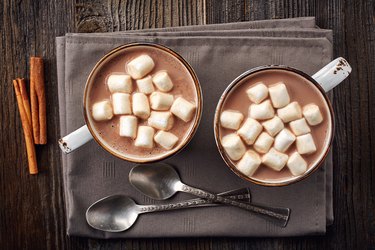
It's hard to imagine anything but sweet goodness in those fluffy little marshmallows floating merrily in a mug of hot cocoa or nestled in the middle of a gooey s'more, but if you're a vegetarian, you might be in for a surprise. What's in marshmallows? In order to get that squishy feel, most marshmallows contain gelatin, which is derived from the body parts of animals.
Tip
Vegetarians don't eat most brands of marshmallows because they contain gelatin: an animal byproduct derived from bones, skin, scales, ligaments and tendons. If you want to avoid gelatin, look for vegan marshmallows.
Video of the Day
What's in Gelatin?
Gelatin can be made from a variety of animal sources by heating the collagen found in the tendons, ligaments, bones and hides of cows, as well as the skin from pigs. Gelatin can also be made by boiling the scales from fish. Once you know what gelatin really is, it's easy to understand why so many opt for vegan marshmallows.
Video of the Day
Gelatin is also added to a variety of other food commonly found at mainstream supermarkets including gelatin desserts, candy, and many frosted cereals. Gelatin is an ingredient in some yogurts and puddings, too. Simply read the ingredient list if you'd like to avoid consuming gelatin.
Read More: Coco Mint Soft-Serve Nice Cream
Ingredients Vegetarians Avoid
About six to eight million adults in the United States eat no animal-based meat, fish or birds, and are considered to be lacto-ovo vegetarian. Lacto-ovo vegetarians still consume dairy products and eggs. Vegans go a step further and avoid consuming all animal products including dairy, eggs and honey. They avoid using or wearing animal products, too.
Vegans also skip products that contain isinglass, commonly found in wine and beer. Isinglass is derived from the bladders of fish and is used as a clarifying agent. Thankfully, many companies are starting to ditch the practice by using non-animal products instead. Thanks to popular demand, Guinness recently removed fish from their beer-making process. To see if your alcoholic beverage of choice is vegan, check out Barnivore.com.
Read More: 12 Classic Comfort Foods Made Vegan
Vegetarian Alternatives to Gelatin
Plant-based alternatives exist for just about anything these days, and that includes delicious marshmallows. Trader Joe's and Dandies make vegan marshmallows; instead of using gelatin, they use tapioca starch to create that spongy feel. Another common alternative to gelatin is agar agar or carrageenan, both of which are colorless, flavorless and derived from seaweed. Instead of slaughterhouse byproducts, it's a plant from the sea that gives Simply Delish Jel Desserts that wiggle jiggle.
If you're looking for an easy vegan pudding to make without using gelatin, consider whipping up some chia seed pudding. Chia seeds have been cultivated since 3500 B.C. and are rich in omega-3 fatty acids, fiber, calcium, protein, phosphorus and zinc, according to Harvard T.H. Chan School of Public Health.
When mixed with liquid, chia seeds form a gel-like consistency. To make a healthy vegan treat, simply mix 1/4 cup chia seeds with 3/4 cup of a plant-based milk of your choice. To make your chia seed pudding extra flavorful, top with fresh fruit, nuts and a natural sweetener you enjoy. If you let the mixture sit overnight in your refrigerator, you'll awake to a tasty and healthy pudding for breakfast.
Consider Eliminating Animal Products
Many people are making the decision to enjoy a healthy plant-based diet due to the impact our food choices have on global warming, animal welfare and our own well-being. People often stop eating animal products for one specific reason, but then after more research, they find the other benefits to enjoying a plant-based diet are equally compelling.
A review of studies published in October 2018 in BMJ Open Diabetes Research & Care found that plant-based diets, centered around fruit, vegetables, grains, nuts, seeds and legumes, can help manage weight and Type 2 diabetes. Plant-based foods are nutrient-dense, yet naturally low in saturated fat and calories. With so many delicious plant-based options to choose from these days, skipping animals products has become an easy, tasty and affordable option.
- Harvard Health Publishing: "Becoming A Vegetarian"
- USDA: "Gelatin Processing"
- USDA Branded Food Products Database: "YOPLAIT ORIGINAL, LF YGRT MNTN BLBRY/STRWBRY, UNPREPARED"
- USDA Branded Food Products Database: "Cherry Gelatin"
- USDA Branded Food Products Database: "KELLOGG'S, FROSTED MINI WHEATS"
- USDA Branded Food Products Database: "GUMMY BEARS"
- USDA Branded Food Products Database: "Vanilla Pudding"
- Trader Joe's Mini Marshmallows
- Dandies Marshmallows
- Simply Delish Jel Desserts
- Harvard School of Public Health: "Chia Seeds"
- BMJ Open Diabetes Res Care: "Effectiveness of Plant-based Diets in Promoting Well-being in the Management of Type 2 Diabetes: a Systematic Review"
- Harvard Health Publishing: "Add More Nutrient-dense Foods to Your Diet"